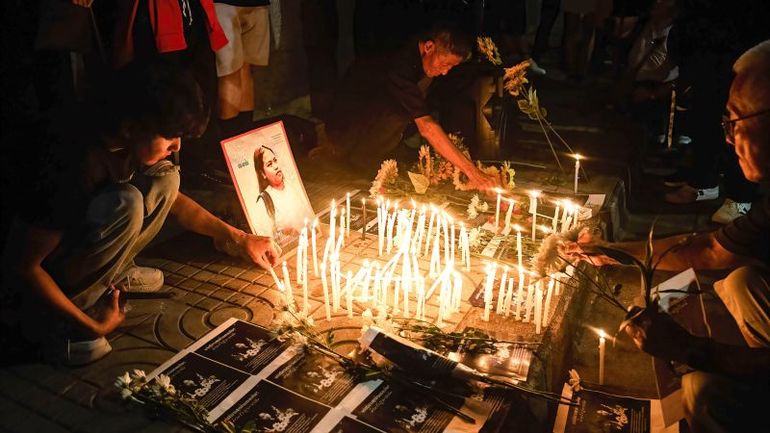
Outcry for Justice: Death of Thai Activist in Detention After Hunger Strike

Following a 65-day hunger strike, a young Thai activist, imprisoned for criticizing the monarchy, passed away, leading to widespread sorrow and demands for justice reform in Thailand.
A young activist in Thailand who was imprisoned for insulting the monarchy passed away on Tuesday after a long hunger strike, officials confirmed. The news of her death has led to an outpouring of sorrow and renewed calls for reform in the country's justice system.
The 28-year-old activist, Netiporn “Bung” Sanesangkhom, reportedly suffered a sudden cardiac arrest, according to a statement from Thailand’s Corrections Department. Despite efforts by a medical team to revive her, she was eventually transferred to Bangkok’s Thammasat University Hospital where she unfortunately did not respond to treatment.
An autopsy will be done to find out why Netiporn passed away, the department mentioned.
Netiporn was part of a protest group called Thalu Wang. This group is advocating for changes in Thailand's monarchy and the strict lese majeste law. This law makes it illegal to criticize the king, queen, or heir apparent and can result in up to 15 years in prison.
The group’s name loosely means “piercing through the palace,” showing their commitment to holding the monarchy accountable. They conduct public opinion polls to challenge the monarchy's authority.
Netiporn participated in the 2020 youth-led protests across Thailand, where millions of young people demanded constitutional, democratic, and military reforms. It was also the first time they openly criticized the monarchy and questioned its power and wealth.
Netiporn had been in jail since January 26, waiting for her trial, as reported by the legal advocacy group Thai Lawyers for Human Rights.
During her time in detention, she went on a 65-day hunger strike until April to protest against the imprisonment of political dissidents without bail. The group mentioned that due to her declining health, she had to be transferred between the prison hospital multiple times.
After being sent back to jail on April 4, Netiporn was reported by the Thai Corrections Department to be able to eat and drink normally. However, she was described as weak and dealing with swollen limbs and anemia. The department mentioned that she had declined to take "minerals and anti-anemia supplements."
In this September 2020 photo, Netiporn "Bung" Sanesangkhom, center, poses for photographs with members of the "Bad Student" group during a protest against Thailand's government in Bangkok, Thailand on September 19, 2020.
In a photo taken in September 2020, Netiporn "Bung" Sanesangkhom stands in the center, surrounded by members of the "Bad Student" group. They are posing for photographs during a protest against Thailand's government in Bangkok, Thailand on September 19, 2020.
The photo was taken by Panu Wongcha-Um and is part of the Reuters file.
The activist dealt with a total of seven criminal cases, with two of them being lese majeste charges. In 2022, she was imprisoned for 94 days and went on a hunger strike. She was eventually granted bail, but it was later taken away.
One of the lese majeste charges against her stemmed from a protest in 2022. During the protest, she displayed a banner at a crowded shopping mall in Bangkok. The banner questioned whether the royal procession had caused any inconvenience.
In a similar protest in 2022, she faced another charge of lese majeste for holding a sign questioning the king's use of power.
In a letter from jail in March, Netiporn shared that being the daughter of a judge made her see that justice in this country does not prioritize the common people.
Understanding the failure in the justice system doesn't require being a judge's daughter. The system is not serving the people but rather catering to the powerful and select groups in the country. It is evident in how easily one can end up in jail for simply asking a question or honking a car.
There are growing calls for reform in the justice system. It is clear that changes are needed to ensure fair and equal treatment for all individuals.
Netiporn's passing has saddened many in the nation and has reignited calls for improvements to the legal system. This system currently permits activists to be refused bail and kept in custody for prolonged periods before their trial.
Amnesty International expressed concern over the situation, stating, "Thai authorities are unfairly denying pro-democracy activists their freedom in an attempt to silence their peaceful opposition. Several individuals are currently in detention, unable to secure temporary release on bail."
Thai authorities should take this tragic incident as a reminder to release all human rights defenders and others who are unfairly detained. On Tuesday night, a candlelight vigil was held outside the Southern Bangkok Criminal Court. Among the attendees was Panusaya “Rung” Sithijirawattanakul, an activist facing lese majeste charges for her participation in the 2020 protests.
A protester in Bangkok on November 14, 2021, holds a sign mentioning article 112, which is Thailand's law against defaming the royal family. The protest took place after a Thai court declared that speeches by protest leaders advocating for changes within the monarchy were seen as an attempt to overthrow the government. Riot police were present to monitor the demonstration.
A protester holds a sign referencing article 112, Thailand's lese majeste royal defamation law, as riot police keep watch during a demonstration in Bangkok on November 14, 2021, after a Thai court ruled that speeches by protest leaders calling for royal reforms amounted to a bid to overthrow the country's monarchy.
Jack Taylor/AFP/Getty Images
Related article
Thailand has sentenced a man to 50 years in prison for insulting the monarchy. Panusaya, speaking to CNN on Wednesday, expressed her shock and disbelief. She questioned whether justice had been served for the deceased individual.
Panusaya is urging Prime Minister Srettha Thavisin's government to address the death and release all political prisoners in Thailand. She questioned, "Do we need more deaths for you to take action?"
Thailand is known for having some of the strictest lese majeste laws in the world. People who are found guilty under Section 112 of the country's criminal code can face sentences that last for decades. In recent years, hundreds of individuals, including Mongkol Thirakhot, have been prosecuted. Thirakhot received a historic 50-year prison sentence in January for posts on social media that were considered damaging to the king.
Many human rights organizations and free speech advocates have expressed concerns about how lese majeste is being used in Thailand. They believe that the law is being used as a political tool to silence critics of the Thai government.
Rights groups have reported a rise in attacks on freedom of expression in Thailand following the 2020 protests. Even with the transition from a military-backed government to civilian leadership, activists and students still face surveillance and intimidation, as highlighted by Thai Lawyers for Human Rights.
Pita Limjaroenrat, leader of the Move Forward Party and Prime Ministerial candidate, arrives at the parliament on July 13, 2023 in Bangkok, Thailand.
Pita Limjaroenrat, leader of the Move Forward Party and Prime Ministerial candidate, arrives at the parliament on July 13, 2023 in Bangkok, Thailand.
Lauren DeCicca/Getty Images
Related article
Thai court orders election-winning party to end its royal reform campaign in blow to voters who backed change
Since July 2020, a legal advocacy group has reported that 1,954 individuals have faced prosecution or charges for participating in political protests and expressing their views. Out of these cases, 286 involved children. Additionally, at least 270 people have been charged with lese majeste during this period.
Ms. Netiporn's passing is a clear indication that issues regarding the unfair prosecution and imprisonment of pro-democracy activists, particularly in lèse-majesté cases, continue to persist during the Pheu Thai government, according to Akarachai Chaimaneekarakate, the group's advocacy lead speaking to CNN.
This unfortunate event occurs at a time when Thailand is vying for a spot on the United Nations Human Rights Council and engaging in negotiations for a free trade agreement with the European Union, Akarachai further explained.
"He stated that political detainees who have not been convicted of any crimes should be granted the right to bail. He emphasized that fundamental freedoms should not come at the cost of their lives."
Editor's P/S:
The tragic death of Netiporn Sanesangkhom, a young Thai activist, has sparked outrage and renewed calls for justice reform in Thailand. Netiporn's passing after a prolonged hunger strike highlights the urgent need to address the country's strict lese majeste laws, which criminalize criticism of the monarchy and have been used to silence dissent. The authorities' refusal to grant bail to activists and their prolonged detention before trial is a blatant violation of human rights.
Thailand's human rights record is under scrutiny as it seeks a seat on the UN Human Rights Council and negotiates a free trade agreement with the EU. The government must take immediate steps to release political prisoners, reform the justice system, and ensure that fundamental freedoms are protected. The international community must also pressure Thailand to uphold its human rights obligations and end the persecution of activists. The sacrifice of Netiporn Sanesangkhom must not be in vain; it must serve as a catalyst for meaningful change in Thailand.










